How RQI Is Reshaping CPR Training in Nursing Education and Clinical Practice
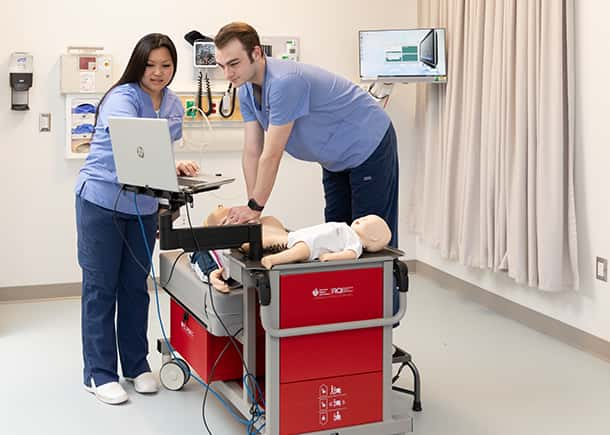

In a recent episode of the NLN Nursing EDge Unscripted podcast, hosts Dr. Kellie Bryant and Dr. Raquel Bertiz sat down with two nurse educators and simulation experts: Dr. Sarah Beebe from Bayhealth Medical Center in Delaware and Dr. Donna Guerra from the University of Alabama in Huntsville.
The podcast explores the positive impact of the Resuscitation Quality Improvement® (RQI®) Program in both academic and clinical settings.
Explore some highlights from the podcast in the article below. And, don’t miss the full podcast episode.

Kellie Dionne Bryant, DNP, WHNP, CHSE, FSSH, FAAN
Director for the Center for Innovation in Education Excellence
National League for Nursing

Raquel Bertiz, PhD, RN, CNE, CHSE
Senior Manager, Center for Innovation in Education Excellence
National League for Nursing

Sarah L. Beebe, PhD, CNM, WHNPr, CHSE
Simulation Lab Program Manager
Bayhealth Medical Center

Donna Guerra, EdD, RN, CNE
Clinical Associate Professor
The University of Alabama in Huntsville
Research indicates that the conventional two-year basic life support training cycle is not optimal for obtaining or retaining CPR skills mastery.1 Skills start to decay in as few as three months after training.2
RQI is a simulation-based CPR education system developed by the American Heart Association and Laerdal Medical. Designed to replace traditional classroom-based CPR training, RQI allows participants to complete self-directed, quarterly CPR skills assessments.
Rather than requiring learners to attend biannual in-person certification sessions, RQI offers a low-dose, high-frequency adaptive learning model that promotes skill retention, confidence, and continuous competency.
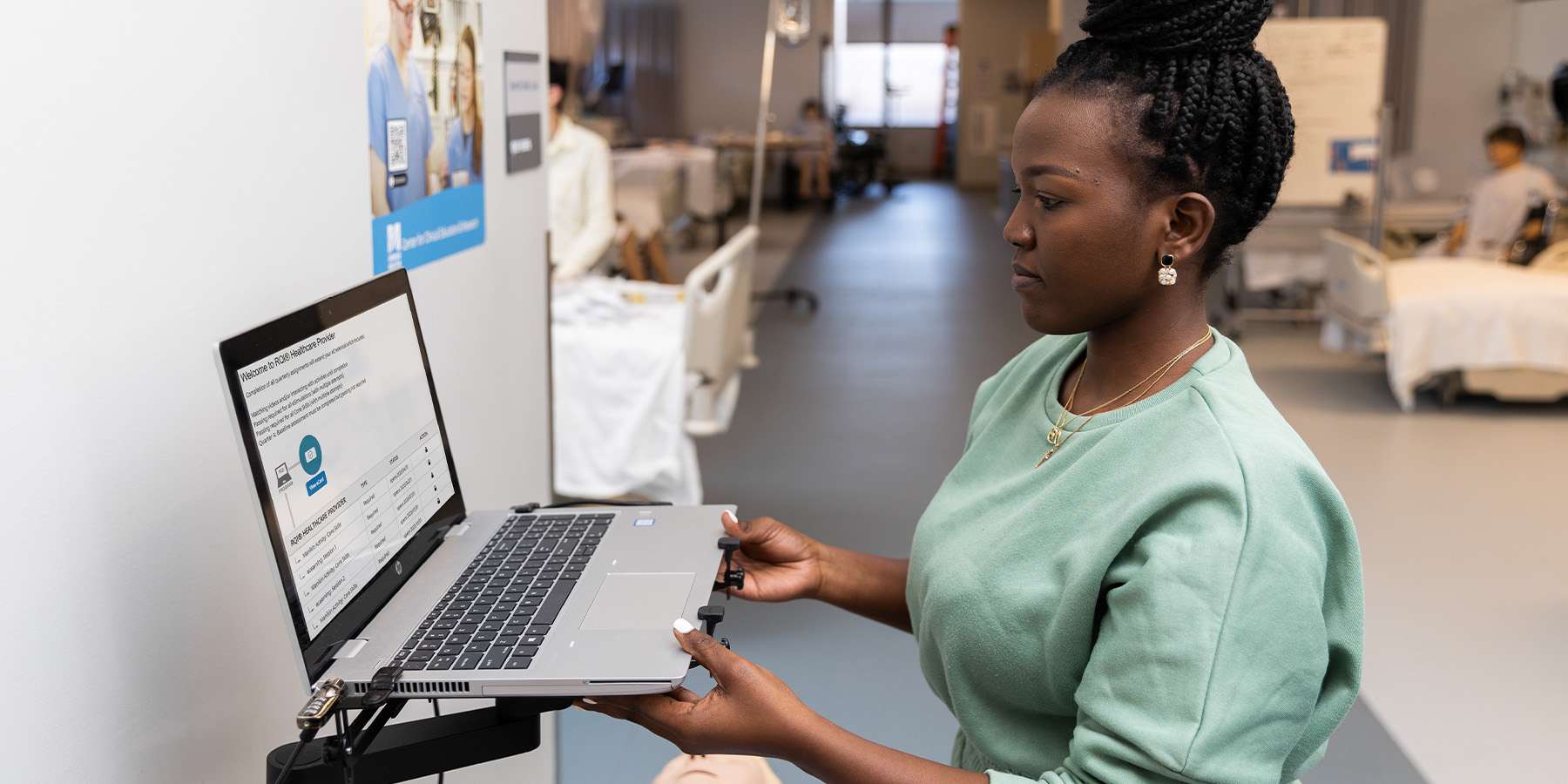
At the University of Alabama in Huntsville, Dr. Donna Guerra and her team took a proactive approach by embedding RQI directly into the undergraduate nursing curriculum.
“Previously, we did require students to have BLS through the American Heart Association,” she explained. “So that part is the same. But it really has revolutionized the way that we approached that by incorporating it into our curriculum.”
They integrated RQI by making it a clinical requirement of their first-semester students in the upper division of their program. “During that semester, they have their first clinical course of health assessment,” she explained. “So we give them clinical time while they’re here in the simulation lab.”
The shift came after the National League for Nursing and Laerdal issued a call in 2022 for nursing education institutions to become early adopters and change agents in CPR education.
“It really has changed the way we approach BLS in our curriculum,” she says. “It is a part of our curriculum now, rather than previously it was a requirement to attend.”
Dr. Donna Guerra, EdD, RN, CNE
Clinical Associate Professor
University of Alabama in Huntsville

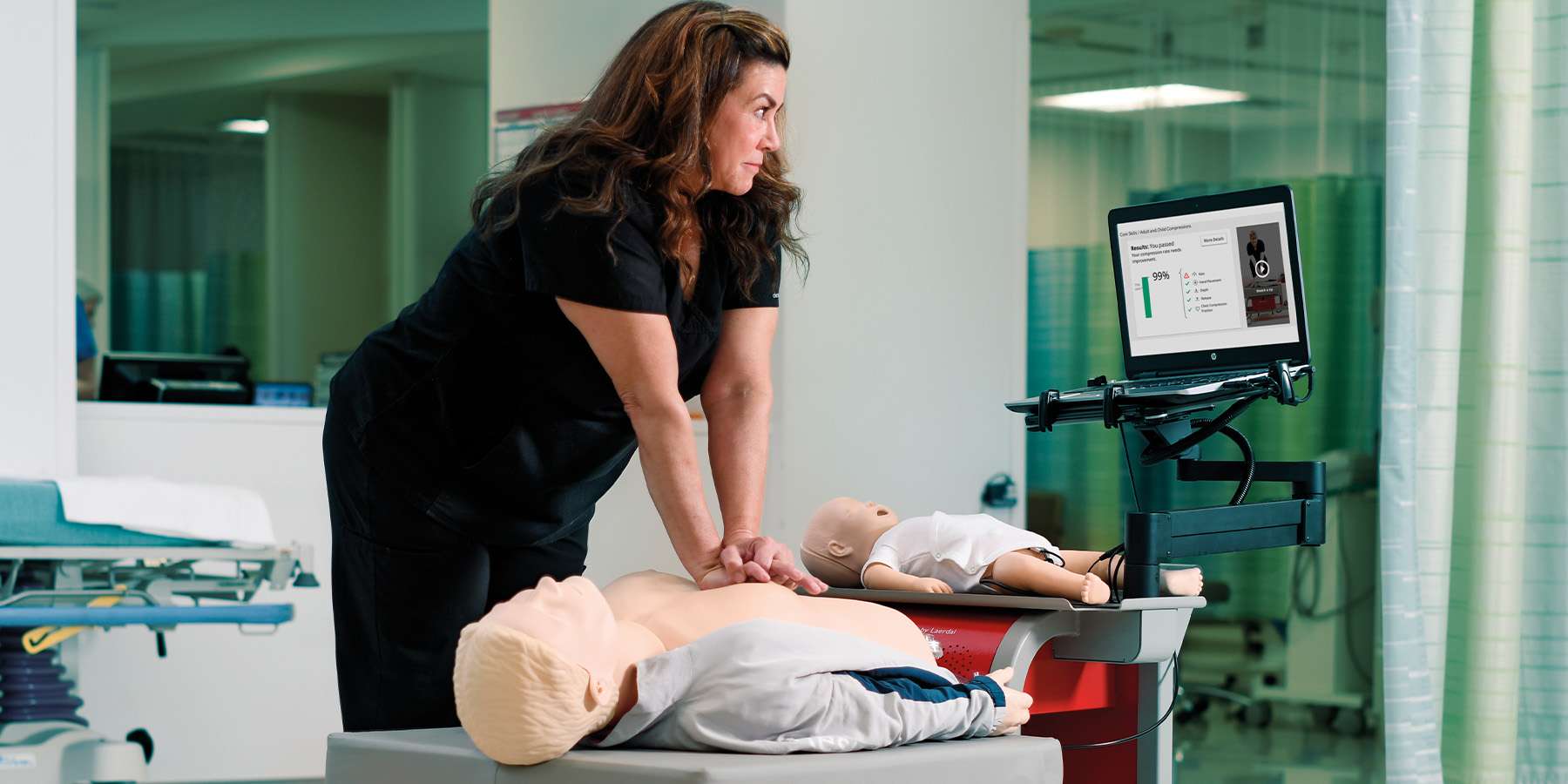
Dr. Sarah Beebe explained how Bayhealth, a healthcare system in Delaware with multiple hospitals and urgent care sites, first implemented RQI in 2017.
Dr. Sarah L. Beebe, PhD, CNM, WHNPr, CHSE
GME Simulation Lab Program Manager
Bayhealth Medical Center

Bayhealth placed RQI carts – mobile simulation stations, equipped with manikins and laptops – throughout their facilities, allowing seamless access for clinical staff. This accessibility and flexibility greatly improved staff engagement and confidence in performing high-quality CPR, especially for clinicians who rarely encounter cardiac arrest situations.
“[With] RQI, you’re doing it quarterly – so you get to practice those skills quarterly,” Dr. Beebe explains. “That’s a big deal for a staff nurse or for a clinician who may not see codes on a regular basis or may not need their CPR skills very often.”
Dr. Beebe noted that having providers master their CPR independently through RQI allowed them to focus more on higher-level skills like teamwork when they came together for mock codes.
“RQI does not replace opportunities to practice as a team,” she explained. “What we found is that when we get our learners in a room together, we can focus on higher-level things. We can focus on team dynamics … instead of focusing all of our time on the BLS skills.”
“Maybe the BLS skills need a little tweak here and there … but for the most part, the BLS skills were down,” she says. “And then we could focus on improving shocking within the first two minutes. We could talk about more nuanced things in a code that we may not have been able to do before: that communication piece, the teamwork, all of that kind of stuff which we know is such a crucial part of a successful resuscitation,” she added.
“That’s been our biggest outcome in our organization,” she shared. “Not to mention codes outside of the OR or the ICU are running more smoothly. And I believe part of that is due to RQI.”
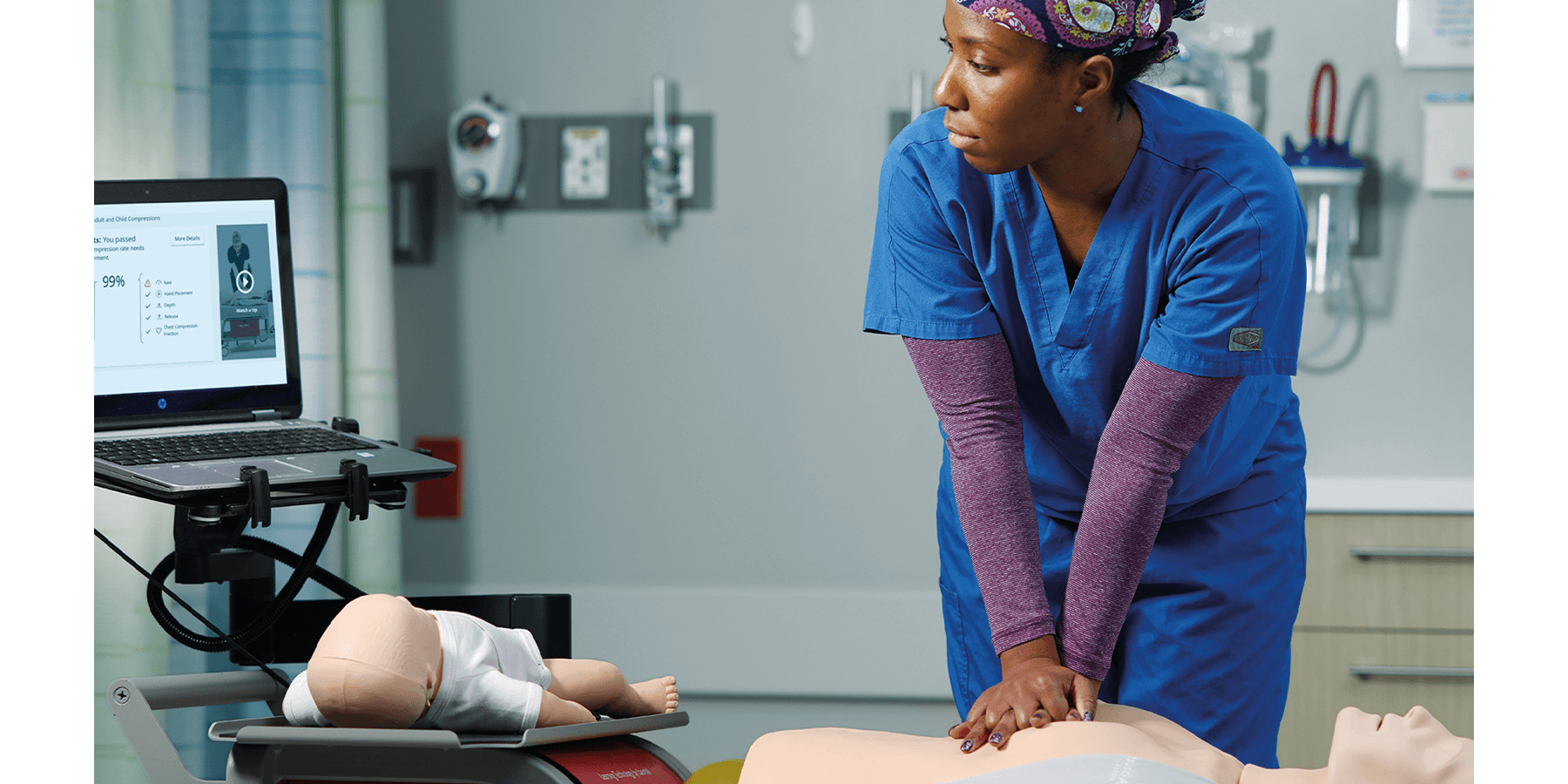
Perhaps the most inspiring part of the podcast came when both educators shared powerful CPR save stories.
Dr. Guerra shared a story of a group of students who identified a pulseless patient during clinical. The students initiated CPR, and impressed the hospital staff so much that they were allowed to continue compressions even after the code team arrived.
“They were able to intervene early and effectively, and they were very confident about the skills that they had. They were so proud of themselves in knowing that they were giving effective CPR,” Dr. Guerra shared.
Dr. Beebe shared a similar story involving a labor and delivery nurse who performed CPR on a man suffering cardiac arrest in a car immediately after leaving a shift.
“She attributed it to doing RQI – because she said, ‘I’m an OB nurse. We don’t do CPR on adults very often. I knew from RQI what I was supposed to do. I was able to do it and save this person.’”
These real-world applications demonstrate the profound, lifesaving potential of frequent CPR training through RQI.
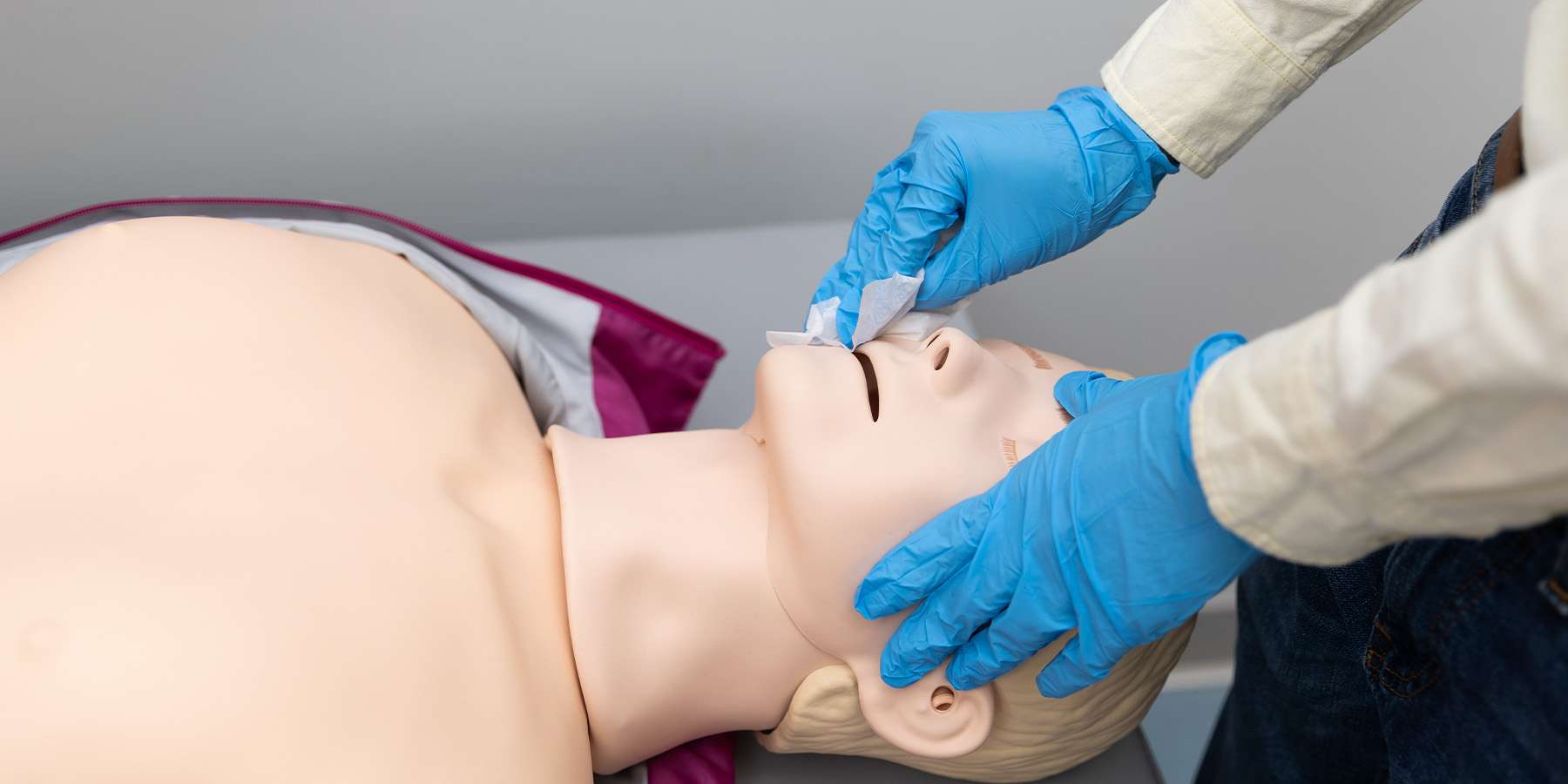
Both guests shared their experiences with implementing and maintaining the RQI program.
“From an academic standpoint, I would say that it’s somewhat minimal,” Dr. Guerra shared. “We have a system administrator who inputs new learners – which, for us, that’s every semester. That probably takes most of the time.”
At Bayhealth, an educator oversees the program. “The overall lift is not what it was when they were teaching classes nonstop,” Dr. Beebe said. “There is maintenance involved and then also there’s some backend work depending on what type of learning management system you have. But it’s well worth it.”
The podcast emphasized that the RQI program offers a scalable, efficient, and highly effective way to teach and sustain CPR skills in both academic and clinical settings. It empowers students and professionals alike to be confident, competent, and ready to save lives.
“Hopefully our listeners out there learned a little bit more how the system can really improve patient outcomes by the frequent exposure and deliberate practice of CPR skills that can help prevent that decay that happens when you’re going two years in between certification,” said host Dr. Bryant.
RQI® - Resuscitation Quality Improvement. (n.d.). RQI Partners, LLC. https://rqipartners.com/programs/rqi-resuscitation-quality-improvement/